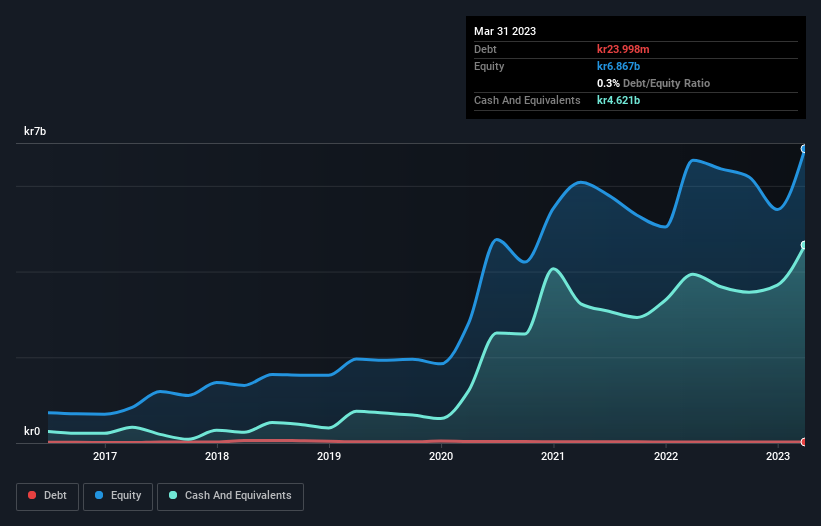
Howard Marks put it nicely when he said that, rather than worrying about share price volatility, 'The possibility of permanent loss is the risk I worry about... and every practical investor I know worries about.' So it seems the smart money knows that debt - which is usually involved in bankruptcies - is a very important factor, when you assess how risky a company is. As with many other companies Nel ASA (OB:NEL) makes use of debt. But the real question is whether this debt is making the company risky.
What Risk Does Debt Bring?
Debt is a tool to help businesses grow, but if a business is incapable of paying off its lenders, then it exists at their mercy. Part and parcel of capitalism is the process of 'creative destruction' where failed businesses are mercilessly liquidated by their bankers. However, a more frequent (but still costly) occurrence is where a company must issue shares at bargain-basement prices, permanently diluting shareholders, just to shore up its balance sheet. Of course, debt can be an important tool in businesses, particularly capital heavy businesses. The first step when considering a company's debt levels is to consider its cash and debt together.
View our latest analysis for Nel
What Is Nel's Debt?
As you can see below, at the end of March 2023, Nel had kr24.0m of debt, up from kr21.8m a year ago. Click the image for more detail. But it also has kr4.62b in cash to offset that, meaning it has kr4.60b net cash.

A Look At Nel's Liabilities
We can see from the most recent balance sheet that Nel had liabilities of kr1.29b falling due within a year, and liabilities of kr335.6m due beyond that. Offsetting this, it had kr4.62b in cash and kr494.0m in receivables that were due within 12 months. So it actually has kr3.49b more liquid assets than total liabilities.
This short term liquidity is a sign that Nel could probably pay off its debt with ease, as its balance sheet is far from stretched. Succinctly put, Nel boasts net cash, so it's fair to say it does not have a heavy debt load! There's no doubt that we learn most about debt from the balance sheet. But it is future earnings, more than anything, that will determine Nel's ability to maintain a healthy balance sheet going forward. So if you're focused on the future you can check out this free report showing analyst profit forecasts.
Over 12 months, Nel reported revenue of kr1.1b, which is a gain of 33%, although it did not report any earnings before interest and tax. Shareholders probably have their fingers crossed that it can grow its way to profits.
So How Risky Is Nel?
Statistically speaking companies that lose money are riskier than those that make money. And in the last year Nel had an earnings before interest and tax (EBIT) loss, truth be told. Indeed, in that time it burnt through kr897m of cash and made a loss of kr1.4b. While this does make the company a bit risky, it's important to remember it has net cash of kr4.60b. That kitty means the company can keep spending for growth for at least two years, at current rates. With very solid revenue growth in the last year, Nel may be on a path to profitability. By investing before those profits, shareholders take on more risk in the hope of bigger rewards. The balance sheet is clearly the area to focus on when you are analysing debt. But ultimately, every company can contain risks that exist outside of the balance sheet. For example, we've discovered 2 warning signs for Nel that you should be aware of before investing here.
At the end of the day, it's often better to focus on companies that are free from net debt. You can access our special list of such companies (all with a track record of profit growth). It's free.
Valuation is complex, but we're here to simplify it.
Discover if Nel might be undervalued or overvalued with our detailed analysis, featuring fair value estimates, potential risks, dividends, insider trades, and its financial condition.
Access Free AnalysisHave feedback on this article? Concerned about the content? Get in touch with us directly. Alternatively, email editorial-team (at) simplywallst.com.
This article by Simply Wall St is general in nature. We provide commentary based on historical data and analyst forecasts only using an unbiased methodology and our articles are not intended to be financial advice. It does not constitute a recommendation to buy or sell any stock, and does not take account of your objectives, or your financial situation. We aim to bring you long-term focused analysis driven by fundamental data. Note that our analysis may not factor in the latest price-sensitive company announcements or qualitative material. Simply Wall St has no position in any stocks mentioned.
About OB:NEL
Nel
A hydrogen company, provides solutions to produce, store, and distribute hydrogen from renewable energy in Norway and internationally.
Flawless balance sheet with limited growth.
Similar Companies
Market Insights
Community Narratives




